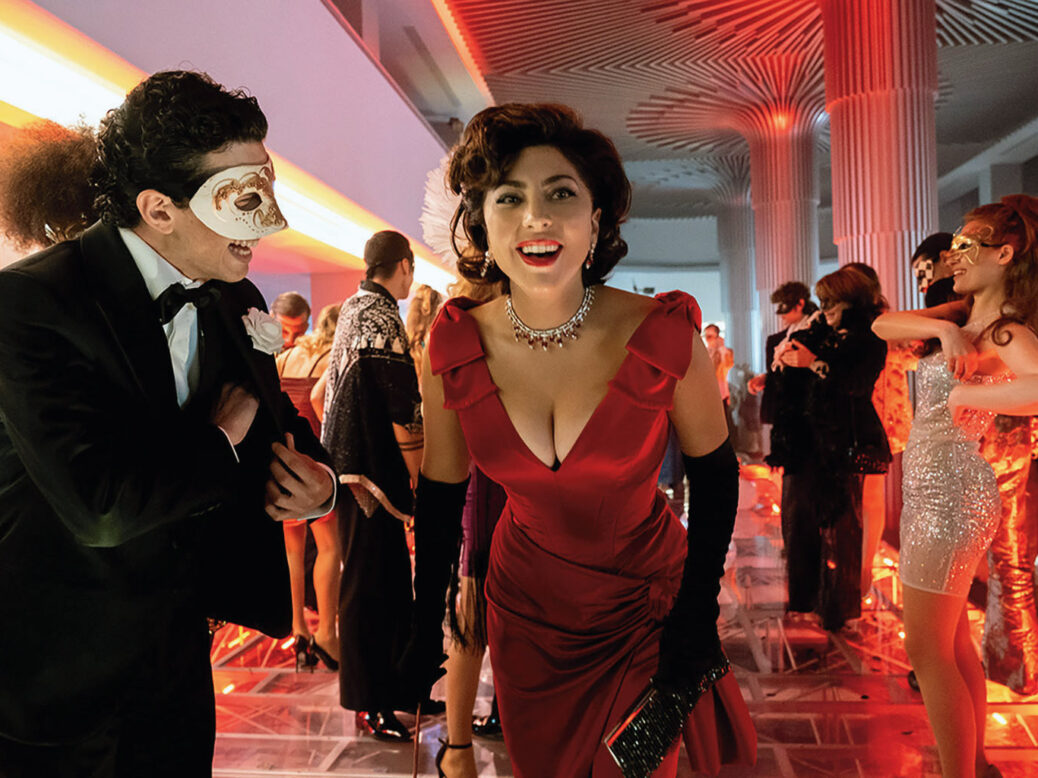
Not everyone’s got the memo about respecting identity and avoiding xenophobia, then. While it might no longer be possible to make war movies where Nazis speak English with heavy German accents studded with Achtungs!, it’s still fine, it seems, to make a film about Italians who inexplicably speak in ridiculously accented English, enhanced by the occasional Ciao, come stai?
True, two of the stars of House of Gucci, Al Pacino and Lady Gaga, have Italian-American ancestry at least, but the rest of the cast? Adam Driver, Jeremy Irons, Jack Huston, Salma Hayek? Not so much.
But director Ridley Scott has always made his splendid hokum confidently in any setting, be it the Roman arena or 21st-century LA, war-torn Somalia or the space tug Nostromo. Having just turned 84, he’s not about to stop now. House of Gucci, his second film this autumn (he has blamed the dreadful box office sales for The Last Duel on “millennian” audiences “brought up on these fucking cellphones”), was filmed in Rome earlier this year in just 43 days, despite pandemic restrictions.
[See also: Brexit Britain is “changing whether it likes it or not”]
Scott’s company bought the rights to the book on which it is based, The House of Gucci by Sara Gay Forden, way back when it was published in 2000. Various actresses have been mooted for the role of murderer Patrizia Reggiani over the years, including Angelina Jolie and Margot Robbie, with various directors considered too. But here’s the boss’s take.
Forden’s excellent book is a study of the history of Gucci, which was founded in Florence in 1921 by Guccio Gucci. From here it takes us through the international expansion postwar by his eldest son Aldo (Pacino), and the family warfare in the Seventies and Eighties that resulted between Aldo, his sons, and Maurizio Gucci (Driver) – the son of Aldo’s brother Rodolfo (Irons). It ends with the company being taken over by investors and the Guccis being booted out in the early Nineties.
Forden is as seriously interested in the question of whether family-run firms can compete in the global marketplace as in the fact that Maurizio’s monster of a wife, Patrizia (Lady Gaga), had him shot dead shortly after he had sold the company and divorced her.
All of those issues, though – perhaps pretty much necessary to understanding the story – have been dropped. Aldo here has only one son, prize twit Paolo (Jared Leto romping away in huge prosthetics), not the three who complicated matters in real life. This is straight dynastic strife in lavish settings, conducted in those daft accents. It might be a royal family who just happen to be a fashion house, too. The production is proficient and shameless, cut to operatic arias and bouncy Italian pop, edited mercilessly for effect – straight from Maurizio furiously banging Patrizia on the office table to their grand wedding, for example.
[See also: Jane Campion’s The Power of the Dog is a Western brimming with menace]
Al Pacino is great, as ever, as Aldo – and not only because his casting here as the godfather of the family plays so amusingly on his definitive role as Michael Corleone. He still has an aura of power and menace, however elderly he becomes or polite he remains.
Driver delivers too as Maurizio, the geeky heir who, having been pushed into the family business by his grasping, ambitious wife, becomes seduced by power and its trappings, outreaching her. However awkward he plays, Driver always has an irreducible presence, a combination of his unarguable physical stature and the way he remains inwardly composed.
The comedy turn is Leto as talentless Paolo, making a fool of himself in a hideously coloured blouson, getting it wrong over and over again, including some English idioms – asking indignantly “does an elephant shit in the jungle?” – almost a Partridge alla Italiana.
But the film belongs to Lady Gaga, who puts demonic energy into projecting Patrizia’s grasping self-centredness in every scene, even when just reacting silently to what she hears (Maurizio feebly saying he’ll think about joining the family business). Her scenes with her witchy psychic Pina (Hayek) are especially good. “I see a great fortune coming your way,” Pina prognosticates. “How big?” Patrizia demands immediately. Her outfits are killers too.
Like so much of Ridley Scott’s work, House of Gucci looks as slick as an ad for its own world (making an actual product placement for Nastro Azzurro seem almost intrusive). Even for such a prestigious enormity, it is too long (158 minutes), but it’s structured as a series of separate big scenes that could be easily self-serialised in due course. Even millennians could then treasure it as a mine of memes.
[See also: How Nella Larsen’s Passing deconstructed the question of race]
This article appears in the 01 Dec 2021 issue of the New Statesman, The virus strikes back






